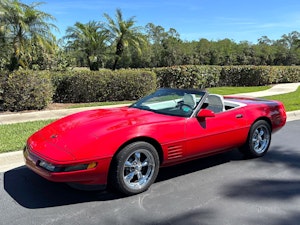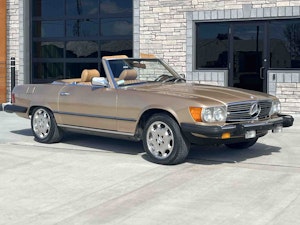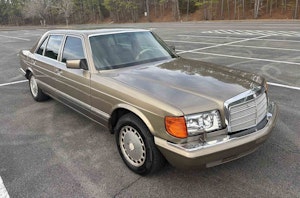Media | Articles
Yard Wealth: How Working on Your Own Cars Is a Radical Act
This article first appeared in Hagerty Drivers Club magazine. Join the club to receive our award-winning magazine and enjoy insider access to automotive events, discounts, roadside assistance, and more.
In 2016, I got a letter from my insurance company, stating that I needed to get rid of the “debris” around my house.
My best guess is that they were referring to the highly sought-after, single-side-cover VW transaxle from the mid-1970s that was sitting under an overhang. Perhaps they also meant the front end, complete from spindle to spindle, that I removed from a donor car and that currently lay in potentia in my carport, awaiting a full rebuild before being transplanted into the Karmann Ghia. Could they mean the body pan rusting along the side of the house, with a perfectly serviceable torsion housing and trailing arms waiting to be harvested? Or the heated leather seats under a tarp, which I spent three hours removing from a late ’90s Audi at Chesterfield Auto Parts (a salvage yard on the south side of town)? Surely they weren’t referring to the roughly 2.6 dirt bikes, two of which needed only a fresh battery and a carb rebuild. At the risk of boasting, I also have an impressive stock of new and scrap metal—rod, flats, plate, square tubing, pipe, sheetmetal, and a few solid billets—all nicely collated by shape, size, and type of alloy.


On my rides through rural Virginia, I see yards where old appliances, ATVs, furniture, and all kinds of crap are not strewn but obviously arranged in front of the house and carefully mowed around. It looks like a yard sale, but it is not. What is it, then? It is something universal, apparently. Dutch historian Johan Huizinga reports that among the Trobriand Islanders, “foodstuffs are not valued solely on account of their usefulness, but also as a means for parading wealth. Yam-houses are so constructed that one can compute from outside how much they contain… The best fruits are the most conspicuous, and particularly fine specimens are framed, decorated with paint, and hung up outside the yam-stores.”
My house is situated such that my yard wealth is not visible from the street, and I have placed it mostly out of sight of my immediate neighbors (because I am neither a Trobriand Islander nor an ostentatious redneck). I’m not sure what the zoning laws are, but for sure the general vibe here, on the West End of Richmond, is more uptight than it was where I lived previously, on the Southside. There, many people had project cars. While the toddlers and their mothers socialized on the sidewalk, the neighborhood social life of the men took place mostly in the unpaved alleys between streets, where the sheds and garages abutted. Everyone knew who had a sandblaster, who had welding equipment, who had a metal lathe, who was especially good at diagnosing electrical gremlins, and so on. There was a good informal economy of favors done and six-packs delivered. My next-door neighbor was a cop. We absolutely hated each other but regularly found ourselves in this kind of interaction.

In my new neighborhood, the lawns are meticulous, the houses are much farther apart, there are no alleys or sidewalks, and recycling is taken very seriously. An outdoor inventory of used auto parts is not part of that equation. Somehow, I gather, a $40K hybrid SUV getting 31 mpg—and the intercontinental energy and material flows that brought it into being—are more “green” than a ratty-looking old Volkswagen assembled from castoff parts, foraged locally, that gets 32 mpg. There is a certain aesthetic of cleanliness that must be adhered to. Better yet, invisibility. To count as green, those ugly chunks of rusting 1970s steel would need to be removed and recycled: melted down in a coal-fired blast furnace and sent across an ocean to become raw material for, say, an electric car, to be returned to the U.S. on a diesel-powered container ship. Such details are best kept out of mind; the main thing is that this journey accomplishes a moral cleansing of the metal.
Marketplace
Buy and sell classics with confidence
My insurance inspector might have also been offended by some items along the side of my garage: A bucket of waste oil, a handful of dead batteries, a cashew container full of used brake fluid, and red plastic cans of gasoline in various flavors (two-stroke mix for the lawn and garden equipment, gas that is too far gone for internal combustion but still useful for starting bonfires, and some fresh, premium stuff). Plus a can of kerosene that I use for cleaning parts. Depending on when he came snooping around, there may have been a yogurt container of half-evaporated epoxy primer, because letting it evaporate and then taking the solid remains to the dump is the prescribed method for disposing of it. Would my insurer prefer that this volatile stuff—filthy and apparently haphazard but in fact carefully tended for use, reuse, alternative use, or disposal—be kept inside the shop, in closer proximity to the welding and grinding sparks?
Nobody wants to live next to a Superfund site; I get that. My point is that our judgments of “responsibility” get clouded with aesthetic considerations that are in turn wrapped up with class-based forms of self-regard and virtue signaling. Zoning laws, as well as the informal norms of bourgeois environmentalism, serve to maintain social demarcations (and with them, wildly divergent property values). They also enforce the planned obsolescence that our economy is based on.

People who work on old cars, whether as enthusiasts or out of necessity, are out of step with this regime. Maybe that’s why we tend to have the secret pride of the dissident: Someone with an alternative frame for making sense of the world, one that allows him to see the value in things that are commonly despised.
Superficially, litter and the rusting carcasses of salvaged cars are both an affront to the eye. But while litter exemplifies that lack of stewardship that is the ethical core of a throwaway society, the visible presence of old cars represents quite the opposite. Yet these are easily conflated under the environmentalist aesthetic, and the result has been to impart a heightened moral status to Americans’ prejudice against the old, now dignified as an expression of civic responsibility. Car people tend to see through that.

Prejudice against the old goes deep in the American psyche. Alexis de Tocqueville reported his conversation with an American sailor in 1831: “I ask him why the vessels of his country are constituted so as not to last for long, and he answers me without hesitation that the art of navigation makes such rapid progress each day, that the most beautiful ship would soon become nearly useless if it lasted beyond a few years.” Here is a striking defense of shoddiness as a natural corollary of the faith in progress.
You don’t have to be a reactionary to see that the idea of “progress” does a lot of mischief in the world. To be skeptical of progress is to have what Michael Oakeshott called a “conservative disposition.” He wasn’t talking about a political ideology. More like an attitude. The conservative, in this sense, doesn’t automatically defer to those who claim to speak for the Future. But neither does he hanker after an imagined past. Rather, he lives more fully in the present: He wants to take care of the stuff that already exists, because he sees the value in it. This is a posture of gratitude and repose in the world as it is, rather than restless pursuit of optimization and novelty. It is a happy place to be. And yes, it tends to require parts cars. Sorry!



***
Matt Crawford is the New York Times bestselling author of Shop Class as Soulcraft and, most recently, Why We Drive.




















Matthew Crawford is a brilliant writer. I have also read his book, “Shop Class as Soul Craft”. He can get very deep into things and cut his ideas into fine slices. As a home mechanic, I deeply appreciate the way he can articulate the moral and social benefits of taking care of your own stuff. His writing makes me feel proud of having the trade skills that many upper class people look down their noses at.
I’m not smart enough or articulate enough to argue with some of his points that I might disagree with, but if you have a junk yard around your house, it’s hard to imagine that you will ever use a lot of the stuff sitting in the weeds. And it’s easy to understand that your neighbors will hold a grudge. My wife has suffered in the past when I had parts cars in the driveway. But for the most part, If I can’t keep my stuff in a garage or storage building, it’s just too much stuff to keep.
When I lived in the city near Mcquire VA hospital, one could light a car on fire in the driveway and no one lifted an eyebrow. Now married and in a newer house in the county, I have to hide my MGB from the HOA. I feel like a rebellious gray beard when changing oil in my vehicles out on the driveway. Enjoy your writings, cheers.
I didn’t start out thinking this would happen but my wife gave me a t-shirt – “I fix things, but my real hobby is collecting projects”. I understand now.
I enjoy reading the comments as much as I did the article!!! Keep them coming please ;)))
In the town I came from some neighbor with a long nose called the town about a car body in my back yard. They gave me a deadline after which the fine would be $300 per day. The rat paid for the squealing; I cut up the car not with a torch, but over a weekend with an air chisel….Just this week I received notice from my property insurance company, suggesting I have three large oak trees removed so they can take better photos of my roof or risk non renewal. Mrs. Tinkerah (a proud tree hugger) and I (a closet tree hugger and enjoyer of summer shade) are aghast.
in california it is illegal, or used to be, to cut down a live oak tree. i am curious if you have similar local/county/state laws
What’s worse, the site of a house with car carcasses scattered around the house in knee-high grass and engines hanging in a kid’s swing, or the monstrosities that the owner builds with said parts, to run up and down the road at all hours of the night?
Ahhh, the joys of country living.
Extremmely good artical enjoyed it very much
Restoring old cars is a noble pursuit. Accumulating tons of old crap on your property in public view in the delusional belief that you are someday going to make use of it all is not noble, it is a sign of a mental disorder commonly called hoarding. If you are suffering from this disorder, seek professional help to free yourself from all the junk that is weighing your life down. You’ll be glad you did (and so will your neighbors!).
Great article from a fellow Richmonder.
I, too, prefer the southside lifestyle a bit more than the crippling sprawl of the west end. But, my shop is up in Hanover, near the airport, and between either Chesterfield or Henrico counties, Hanover is like the Wild West!
YEP. Your Place Has Turned Into A JUNK YARD, No Matter How Much You Want To Redefine It. You Can Only Restore ONE Vehicle At A Time. Either Construct A Building To Hide Them In, Or Clean It Up. In My Area, If It Isn’t Licenced, State Inspected And Insured, OR Put In A Building Out Of Sight, Or On “Commercial” Business Property With Fluids DRAINED; It Either Has To Be Removed, Or The Owner FINED $50.00 A Day In Violation Of Zoning Codes. Children Could Get Injured Playing Around That Stuff, Get Stung By Bees Nesting Inside Them, Or Create Homes For Unwanted Critters. Your Place Has Gone To An Extreme Indeed…
matt, i enjoyed your article but have mixed thoughts regarding your situation. i believe a responsible home/land owner has a right to do what they want on their property (the key here is ‘responsible’), all laws aside. at the same time, said owner should have enough respect for themselves AND their neighbors by not having a steaming pile of junk displayed for all to see. at the veerrry least, it should be outta site.
by my understood definition of the phrase, your insurance company committed an invasion of privacy. but then today that phrase has much less meaning and worth. and there are probably loopholes if not specific laws that give them the right to, um, monitor what they’re insuring. doesn’t make it right, though.
not wanting to kick the hornet’s nest, but i do believe one has a responsibility to others as well as themselves. yes, batteries should be recycled, volatile fluids should be properly stored, large amounts of ‘stuff’ should be gone through and inventoried. it is surprising, using an open objective mind, what one finds what they don’t or won’t need, and a lot of it could be sold/recycled/disposed of. neatening up and organizing what one has outside can make a big difference both to yourself and others. but it hasta be realized there is too much ‘stuff’ in the first place, ESPECIALLY before collecting more. i’m in a similar situation as you are and am more or less a hypocrite. but i’m aware of my problem and working on it, although admittedly slow. one of my motivators is thinking of my kid having to deal with it all once i’ve ‘moved on’. i’ve made a project of reducing/decluttering and sometimes having fun doing it. oh sure, there’ll be a steaming pile remaining after i go, but in the least it’ll be reduced.
It’s not that an occasional parts car is a bad thing, it’s when they pile up and no progress is seen.
I have a handful,of projects that I’m working on at any point in time. But it’s important to finish those projects, at least once in a while. When that’s done, clean up the leftovers, tidy up the space and start the next one.
If one of my neighbors had a rust bucket sitting in plain sight for two years, I’d get damn tired of looking at it, too. Your neighbors deserve consideration.
I am used to the fact that my neighbors and I don’t speak the same figurative language and I can handle that. I wish I could show them how rewarding making dead machinery breathe again is but they just don’t get it anymore than I understand anything about what they do. What I do worry about is the next generation who may become so far removed from basic transportation needs that they will settle into a rhythm of being cradle to grave cared for without a notion as to what sparks the movement operation and I guess my contribution to the neighborhood is just adding a little imagination, sweat and petrochemical mixtures to a greasy pile of parts to create what at first might be a smokey, dangerous nightmare albeit with all the right noises, to some people anyway. The evolution of a project is an interesting thing however to even the most seemingly uninvolved neighbors and seeing gradual improvement inspires even the most jaded of them.
When I was a kid the grownups all frowned upon teenagers stirring up trouble with hot rods and muscle cars,
nowadays it seems the foolish old men are doing all the racket making, but occasionally a spark of interest might land on the “tinder” of youth.
Insurance is based on risks old gas not stored safely or old junk cars can be a hazard the more the risk the higher the insurance or the insurance company does not tocover the risk
I agree with Brian W if they want my money bad enough they will work with me